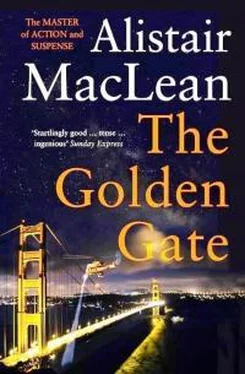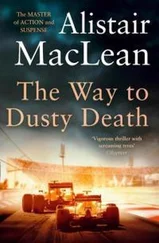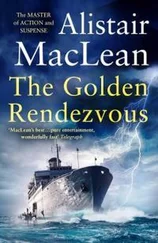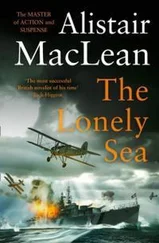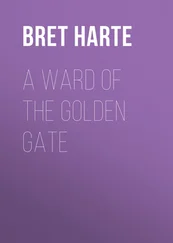O’Hare gave a creditable impression of a man whose patience was wearing very very thin. ‘An aerosol air-freshener.’ It was the fake Prestige can that contained the knock-out gas.
Branson freed the can. ‘Sandalwood,’ he said. ‘You have an exotic taste in perfumes.’ He shook the can, listened to the gurgling inside, then replaced the canister in its clip. O’Hare hoped that the dampness on his brow didn’t show.
Branson finally directed his attention to the big oiled-wood box on the floor. ‘And what’s this?’
O’Hare didn’t answer. Branson looked at him. O’Hare was leaning with a negligent elbow on top of a locker, his expression a mixture of barely concealed impatience and bored indifference.
Branson said sharply: ‘You heard me.’
‘I heard you. I’ve had just about enough of you, Branson. If you expect me to show any obedience or respect for you, then you’re way out of your mind. I’m beginning to think you are illiterate. Can’t you see those big red letters? They spell out “Cardiac Arrest Unit”. Emergency equipment for patients who have, or may shortly be expected to have, a heart attack.’
‘Why the big red seal in front?’
‘There’s more to it than just that red seal. The whole unit is hermetically sealed. The entire interior of that box and all the equipment it contains is completely sterilized before the box is sealed. One does not inject an unsterilized needle in or near the heart of a cardiac patient.’
‘What would happen if I broke the seal?’
‘To you, nothing. You’d just be committing the most cardinal sin in any hospital. You’d render the contents useless. And the way you’re carrying on the President is a prime candidate for a heart attack at any moment.’ O’Hare was acutely conscious that the aerosol can was only inches from his hand. If Branson broke the seal and started delving deeper he intended to use the aerosol without a second thought: Branson could hardly be expected to be the person who would fail to recognize a cyanide air pistol when he saw it.
Branson’s face was without expression. ‘The President–’
‘I’d sooner turn in my licence than insure the President for anything. I am a doctor. Twice your needling and public humiliation have driven him into a state of near-apoplexy. You never know, third time you may be lucky. Go on and break the bloody seal. What’s another death on your conscience?’
‘I’ve never been responsible for anybody’s death in my life.’ Without as much as looking at O’Hare, Branson abruptly left the ambulance. O’Hare went to the rear door and looked after him thoughtfully. Revson was ambling across the roadway and Branson spared him neither a word nor a glance, behaviour uncharacteristic of Branson who was much given to directing penetrating glances at everyone, usually for no reason whatsoever. Revson looked after him in some puzzlement, then strolled off towards the ambulance.
Revson said: ‘You just been put through the grinder, too?’
‘That you can say again.’ O’Hare spoke with some feeling. ‘You, too?’
‘Not me. I’ve been searched so often that nobody would bother. Everybody else was, though. It must have been pretty thorough. I heard more than one ladylike scream of protest.’ He looked after the departing Branson. ‘Our mastermind seems unusually preoccupied.’
‘He was acting a bit oddly when he left.’
‘He drew a blank, obviously.’
‘Yes.’
‘Didn’t even investigate your one sealed container – the cardiac unit?’
‘That’s when he started behaving oddly. I’m pretty sure that he was about to break the seal when I pointed out that that would de-sterilize the equipment and render it useless. I also pointed out that I considered the President a prime candidate for a heart attack and that I regarded him as being the prime cause for this. That was when he backed off.’
‘Understandable, I would have thought. He doesn’t want to lose his principal hostage.’
‘That wasn’t the impression he gave me. He also said another funny thing when he left, that he’d never been responsible for anyone’s death in his life.’
‘To the best of my knowledge that’s true. Maybe he just didn’t want to spoil his good record.’
‘Could have been, could have been.’ But the puzzled expression was still on O’Hare’s face.
Van Effen regarded Branson with a curiosity that his face didn’t register. Branson, he thought, was a shade less than his old ebullient self. Van Effen said: ‘Well, how did you find the ambulance and the good doctor? Clean?’
‘The ambulance is. God damn it all, I quite forgot to go over O’Hare.’
Van Effen smiled. ‘One tends to. Pillars of moral rectitude. I’ll go look at him.’
‘How did it go with you?’
‘There were ten of us and we were pretty thorough – and pretty thoroughly unpopular. If there was a silver dollar on the Golden Gate Bridge we’d have found it. We didn’t find any silver dollars.’
But then Branson and his men had been searching the wrong places and the wrong people. They should have searched Chief of Police Hendrix before he’d been allowed to leave the bridge.
Hagenbach, Milton, Quarry, Newson and Carter were seated round the long oblong table in the communications wagon. There were bottles of liquor on a wall-mounted sideboard and, judging from the levels of the liquids in the bottles and the glasses in front of the five men, they weren’t there for purely decorative purposes. The five appeared to be concentrating on two things only: not speaking to one another and not looking at one another. The bottoms of their glasses appeared to hold a singular fascination for them: comparatively, the average funeral parlour could have qualified as an amusement arcade.
A bell rang softly at the inner end of the wagon. A shirt-sleeved policeman, seated before a battery of telephones, lifted one and spoke softly into it. He turned and said: ‘Mr Quarry, sir. Washington.’
Quarry rose to his feet with the alacrity of a French aristocrat going to the guillotine and made his way to the communications desk. His end of the conversation appeared to consist of a series of dispirited grunts. Finally he said, ‘Yes, as planned,’ returned to the table and slumped into his chair. ‘The money has been arranged just in case it’s needed.’
Milton said heavily: ‘Can you see it not being needed?’
‘The Treasury also agrees that we should stall them for up to twenty-four hours from noon tomorrow.’
Milton’s lugubriousness didn’t alter. ‘By Branson’s escalation demands that means close on another fifty million dollars.’
‘Peanuts to what he’s asking.’ Milton made a stillborn attempt to smile. ‘Might give one of our brilliant minds time to come up with a brilliant idea.’ He relapsed into a silence which no one seemed inclined to break. Hagenbach reached for a bottle of scotch, helped himself and passed the bottle around. They resumed their mournful inspection of the depths of their glasses.
The bottle was not long left undisturbed. Richards and Hendrix entered and, without speaking, sat down heavily in two vacant chairs. The Vice-President’s hand reached the bottle just fractionally before that of Hendrix.
Richards said: ‘How did we look on TV tonight?’
‘Goddamned awful. But no more awful than the seven of us sitting around here without a single idea in our heads.’ Milton sighed. ‘Seven of the allegedly best governmental and law enforcement minds in the business. The best we can do is drink scotch. Not a single idea among us.’
Hendrix said: ‘I think perhaps Revson has.’ He fished a piece of paper from the inside of a sock and handed it to Hagenbach. ‘For you.’
Читать дальше
